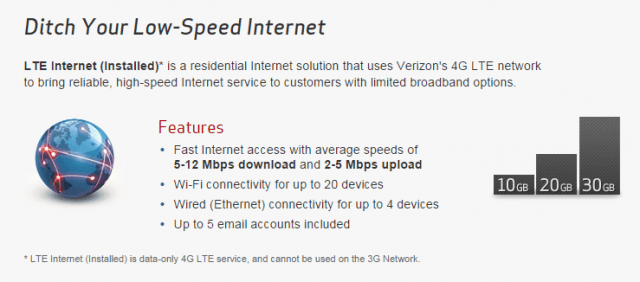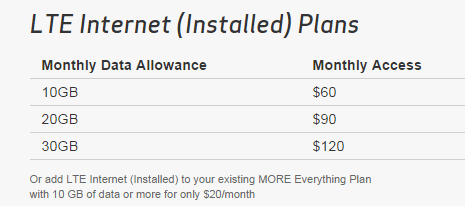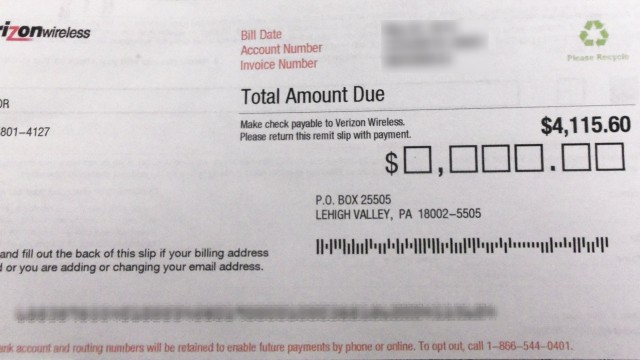 If your family budget cannot handle a $200 monthly cell phone bill from AT&T or Verizon and you can keep your data usage to around 1GB, Sprint has a deal for you.
If your family budget cannot handle a $200 monthly cell phone bill from AT&T or Verizon and you can keep your data usage to around 1GB, Sprint has a deal for you.
On Wednesday, Sprint unveiled a low-end family data plan offering 1GB of data for $20 a month, an improvement over the 600MB data option Sprint used to offer. It’s also a better deal than the 500MB $20 buys you on Verizon’s network or the piddling 300MB AT&T delivers on its budget plan.
“This entry-level sharable data allowance reinforces Sprint’s commitment to offering customers the best value in wireless,” said Marcelo Claure, Sprint CEO. “We’re offering customers a choice – whether they need a small amount of data or are a high-end data user.”
Customers can build their own plan in three steps. First, choose the shared data allowance. For 1GB, it’s $20 per month for up to 10 lines. Second, add data access for phones with unlimited talk and text while on the Sprint network. The data access charge for non-discounted phones is $25 per month per line for 1GB through 16GB. Third, add your tablet devices for $10 per month per line and mobile broadband devices for $20 per month per line. There is no early termination fee and no annual service contract with non-discounted phones.
In addition, when customers switch their number to Sprint, a family with up to 10 lines can get 20GB of shared data and unlimited talk and text for only $100 a month through 2015.
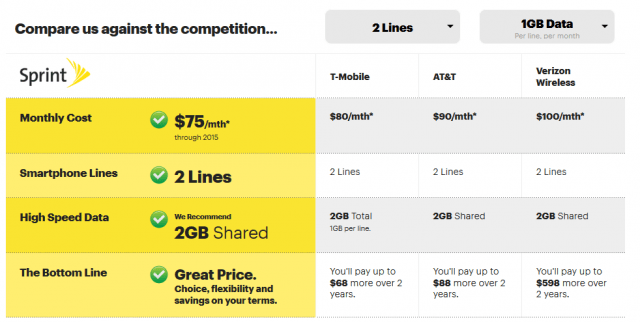
This chart reflects a 2GB shared data plan for two lines that amounts to $75 a month before taxes, fees and surcharges.
Since wireless carriers discovered reports of a spectrum crisis were vastly exaggerated, they have fallen all over each other with “double your data” promotions and other allowance boosters. Sprint’s family plans allow customers to divide up an inexpensive data plan across all phones on the account. If you spend most of your time on Wi-Fi or share an account with parents or grandparents not accustomed to using much data, Sprint’s plan may deliver enough data to satisfy.
Sprint has hemorrhaged its high-end customers for several quarters, mostly because its 3G data service is barely usable and its new 4G LTE network has rolled out at the typical speed of a glacier and its performance has not always impressed. Sprint has cut prices and is trying to find a stable niche among budget-conscious postpaid customers unwilling to pay AT&T and Verizon’s asking price but are willing to tolerate reduced coverage in favor of a better price. Sprint and T-Mobile are both competing for these customers. Verizon says it cannot be bothered being seen as a discount carrier, and AT&T is committed to keeping its average revenue per customer numbers growing.


 Subscribe
Subscribe
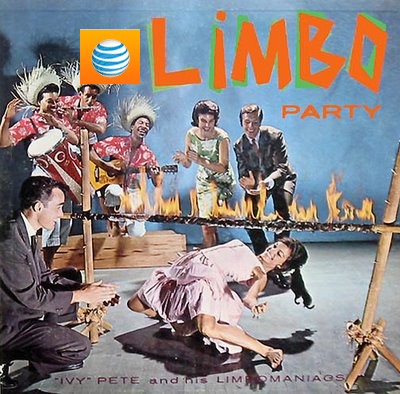
 T-Mobile has asked the Federal Communications Commission to investigate AT&T’s “artificially high roaming rates” charged when its customers travel outside of T-Mobile’s home service area.
T-Mobile has asked the Federal Communications Commission to investigate AT&T’s “artificially high roaming rates” charged when its customers travel outside of T-Mobile’s home service area. Because of AT&T’s artificially high roaming rates, T-Mobile wireless customers roaming in South Africa have a better user experience than customers roaming on AT&T’s network in South Dakota, argues T-Mobile. Their speed is twice as fast, and their data usage is unlimited.
Because of AT&T’s artificially high roaming rates, T-Mobile wireless customers roaming in South Africa have a better user experience than customers roaming on AT&T’s network in South Dakota, argues T-Mobile. Their speed is twice as fast, and their data usage is unlimited.

